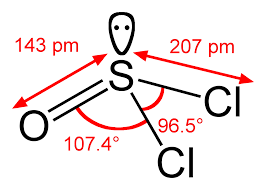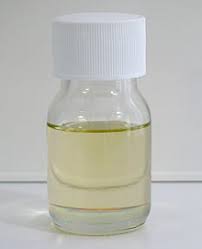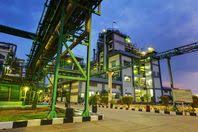


Thionyl chloride (source Wikipedia) is primarily used as a chlorinating reagent, It is toxic, reacts with water, and is also listed under the Chemical Weapons Convention as it may be used for the production of chemical weapons.
Thionyl chloride is mainly used in the industrial production of organochlorine compounds, which are often intermediates in pharmaceuticals and agrichemicals. It usually is preferred over other reagents, such as phosphorus pentachloride, as its by-products (HCl and SO2) are gaseous, which simplifies purification of the product.
Many of the products of thionyl chloride are themselves highly reactive and as such it is involved in a wide range of reactions.
Thionyl chloride is a component of lithium–thionyl chloride batteries, where it acts as the positive electrode (cathode) with lithium forming the negative electrode (anode).
SOCl2 is a reactive compound that can violently release dangerous gases upon contact with water and other reagents.
Thionyl chloride is aggressive against phenolic resin which tend to be corroded especially over 100°C. Low quality graphite face low lifetime in presence of thionyl chloride. Our grade GT KELITE+ perform very well up to 100% concentration @100°C.
For applications requiring long lifetime, higher concentration and concentration GT developed grade GT FLON which allow resistance up to 100% @ 180°C.
We can proceed to corrosion test or provide coupon for test on request here.
Equipment frequently used
GT DISC
GT BLOC
GT TUBE
GT CUBIC
GT PLATE
GT TOWER
Materials frequently used
Get in touch here with us to know more.
